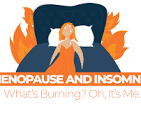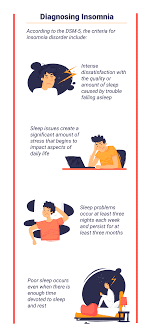The Connection Between Menopause and Insomnia
Menopause is a natural biological process that marks the end of a woman’s menstrual cycles. During this transition, hormonal changes can lead to various symptoms, including hot flashes, mood swings, and insomnia. Insomnia, characterized by difficulty falling asleep or staying asleep, is a common issue that many menopausal women experience.
One of the primary reasons for insomnia during menopause is the fluctuation of hormones, particularly estrogen and progesterone. These hormonal changes can disrupt the body’s internal clock, making it challenging to maintain a regular sleep pattern. Additionally, hot flashes and night sweats associated with menopause can also contribute to sleep disturbances.
Research suggests that women going through menopause are more likely to experience insomnia compared to premenopausal women. Lack of quality sleep can have a significant impact on overall health and well-being, leading to daytime fatigue, irritability, difficulty concentrating, and an increased risk of other health conditions.
Managing Menopausal Insomnia
While menopausal insomnia can be frustrating, there are strategies that women can implement to improve their sleep quality:
- Establish a bedtime routine: Creating a relaxing bedtime routine can signal to your body that it’s time to wind down and prepare for sleep. This may include activities such as reading a book, taking a warm bath, or practicing relaxation techniques.
- Maintain a comfortable sleep environment: Ensure your bedroom is conducive to sleep by keeping it dark, quiet, and cool. Invest in a comfortable mattress and pillows that support restful sleep.
- Manage stress: Stress can exacerbate insomnia symptoms. Engage in stress-reducing activities such as yoga, meditation, or deep breathing exercises to promote relaxation before bedtime.
- Consult with a healthcare provider: If insomnia persists despite trying self-care strategies, consider speaking with your healthcare provider. They may recommend treatments such as hormone therapy or other medications to help manage menopausal symptoms.
It’s essential for menopausal women experiencing insomnia to prioritize their sleep health and seek support when needed. By addressing the underlying causes of sleep disturbances and implementing healthy sleep habits, women can improve their quality of life during this transitional phase.
Top 5 FAQs About Managing Menopause Insomnia: Causes, Treatments, and Effective Sleep Aids
- What is the best sleep aid for menopause?
- How do you treat insomnia during menopause?
- Why does menopause cause lack of sleep?
- How long does menopause insomnia last?
- What supplements are good for menopause insomnia?
What is the best sleep aid for menopause?
When seeking the best sleep aid for menopause-related insomnia, it is essential to consider individual preferences and health needs. Some women find relief with over-the-counter sleep aids containing ingredients like melatonin or valerian root, which can help promote relaxation and improve sleep quality. Prescription medications, such as hormone therapy or low-dose antidepressants, may also be recommended by healthcare providers for severe cases of menopausal insomnia. Additionally, non-pharmacological approaches like cognitive-behavioral therapy for insomnia (CBT-I), relaxation techniques, and lifestyle modifications such as maintaining a consistent sleep schedule and creating a conducive sleep environment can also play a significant role in managing menopausal sleep disturbances. It is advisable to consult with a healthcare professional to determine the most suitable sleep aid based on individual circumstances and preferences.
How do you treat insomnia during menopause?
Treating insomnia during menopause often involves a combination of lifestyle changes, self-care strategies, and, in some cases, medical interventions. To address sleep disturbances associated with menopause, individuals can focus on establishing a consistent bedtime routine, creating a comfortable sleep environment, managing stress levels through relaxation techniques, and incorporating regular exercise into their daily routine. Additionally, consulting with a healthcare provider is important to explore potential treatment options such as hormone therapy or prescribed medications to help manage menopausal symptoms and improve sleep quality. It’s crucial for women experiencing insomnia during menopause to prioritize their sleep health and seek professional guidance to find an effective treatment plan tailored to their individual needs.
Why does menopause cause lack of sleep?
During menopause, hormonal changes, particularly fluctuations in estrogen and progesterone levels, can disrupt the body’s natural sleep-wake cycle. These hormonal shifts can impact the production of melatonin, a hormone that regulates sleep, leading to difficulty falling asleep or staying asleep. Additionally, symptoms commonly associated with menopause, such as hot flashes and night sweats, can further disrupt sleep patterns. The combination of hormonal changes and physical discomfort during menopause can contribute to the lack of sleep experienced by many women going through this transitional phase. It is important for women experiencing menopausal insomnia to seek support and explore strategies to improve their sleep quality and overall well-being.
How long does menopause insomnia last?
Menopause insomnia can vary in duration for each individual experiencing it. For some women, menopausal insomnia may be a temporary issue that resolves on its own after a few months or years as hormone levels stabilize. However, for others, menopausal insomnia can persist for a longer period, impacting their sleep quality and overall well-being. It is essential to consult with a healthcare provider to discuss individual symptoms and explore treatment options that can help manage menopausal insomnia effectively and improve sleep patterns during this transitional phase of life.
What supplements are good for menopause insomnia?
When seeking supplements to address menopausal insomnia, it is essential to consult with a healthcare provider to determine the most suitable options based on individual needs and health conditions. Some supplements that are commonly recommended for menopause-related sleep disturbances include melatonin, valerian root, magnesium, and black cohosh. Melatonin is a hormone that regulates the sleep-wake cycle and can help improve sleep quality. Valerian root is known for its calming effects and may promote relaxation before bedtime. Magnesium plays a role in promoting relaxation and muscle function, potentially aiding in better sleep. Black cohosh is an herb that has been traditionally used to alleviate menopausal symptoms, including insomnia. However, it is crucial to discuss the use of supplements with a healthcare provider to ensure safety and effectiveness in managing menopausal insomnia.


